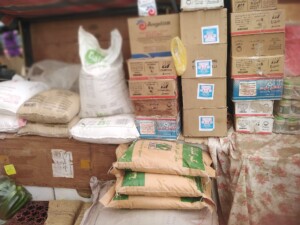Gold export: Bank of Sudan announces stiffer control measures
The Central Bank of Sudan (CBoS) issued a new circular to banks and related authorities on Thursday, banning the export of gold by government agencies and foreigners, individuals, and companies, excluding concession companies operating in mining. The circular also limits the role of the Central Bank of Sudan to purchasing gold for the purpose of building reserves only.
 (File photo)
(File photo)
The Central Bank of Sudan (CBoS) issued a new circular to banks and related authorities on Thursday, banning the export of gold by government agencies and foreigners, individuals, and companies, excluding concession companies operating in mining. The circular also limits the role of the Central Bank of Sudan to purchasing gold for the purpose of building reserves only.
The measures outlined in the circular, to come into effect immediately, will apply to the trade and export in bullion and unwrought gold, with the value of transactions (calculated according to international stock exchange prices), to be certified by the Gold Exporters union.
The CBoS circular allows concession companies to export 70 per cent of their production, after deducting government shares, and the remaining 30 per cent is to be sold to the Bank of Sudan or its authorised representative.
It also allows small mining companies to export 15 per cent of the remainder of their production after the government share of the total production is collected, provided that the proceeds are kept in a special account for the companies with the Bank of Sudan. The remaining 85 percent is to be sold to the Bank of Sudan or its representative, and the owner of the proceeds is s allowed to use 70 percent for the import of strategic goods, and 30 per cent for essential goods.
Export regulated
Sudan is reportedly the second-largest producer of gold in Africa and the ninth in the world. The production however is often driven by unregulated, artisanal (individual subsistence) mining, and routine gold smuggling across international borders is a constant problem. Estimates are that between 50 per cent and 80 per cent of Sudan’s gold is smuggled out of the country. It is also known that proceeds have been used to finance the internal conflict.
Economist Hasan Bashir said in an interview with Sudan Today on Radio Dabanga in March that the decisions of the Gold Exchange are impeded by the beneficiaries of smuggling.
The total gold production of Sudan in 2020 reached 36.6 tons, which is 9.6 tons more than in 2019, according to official figures quoted by the director of the Sudanese Company for Mineral Resources, Mubarak Ardol, in January 2021.
The gold revenues have been allocated to various “revenue partners, including the Finance Ministry, the states of Sudan, the Zakat (Muslim alms) Chamber, the Geological Research Authority, and other institutions.
For years, the Central Bank of Sudan (CBoS) was the sole institution legally allowed to trade in gold. The bank that had a monopoly on exports, bought gold in Sudan at fixed prices at collection sites in the country, which led to illegal trade. In January, Sudan decided to permit private traders to export gold, in a bid to stop the recurrent smuggling of gold, and to attract foreign currency.
In July 2020, Sudan started to export gold in a regulated way, after a gold stock market was established in May 2020 to level the price of the precious metal in the country with the international tariff. The High Committee for Economic Emergencies decided to form a mechanism to monitor the production, transport, sale, and export of gold. Measures have been taken as well to combat gold smuggling via Khartoum International Airport.











 and then
and then